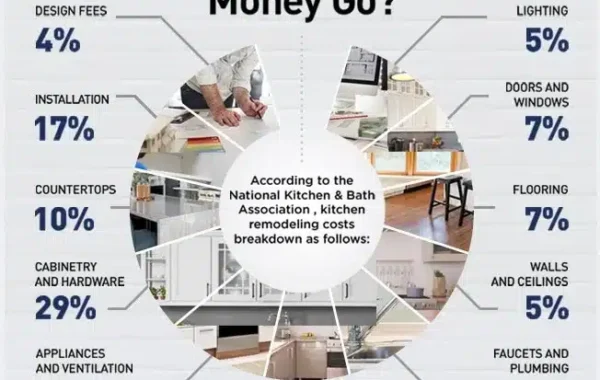How to Choose the Right Remodeling Contractor in Chicago Suburbs
Embarking on a home remodeling project in Chicago Suburbs can be both exciting and daunting. Whether you’re dreaming of a modern kitchen, a luxurious bathroom, or a complete home transformation, the success of your project hinges on selecting the right remodeling contractor. Chicago Suburbs homeowners have unique considerations, from navigating local building codes to understanding weather-related challenges. This comprehensive guide will walk you through the essential steps to finding a reputable, reliable, and qualified contractor who can bring your vision to life, minimize stress, and deliver exceptional results.
1. Define Your Project Scope and Budget
Before you even start your contractor search, take the time to clearly define your project’s scope. What specific areas of your home are you remodeling? What are your must-have features versus nice-to-haves? Having a detailed project outline will help contractors provide accurate estimates and understand your expectations.
Simultaneously, establish a realistic budget. Remodeling projects often incur unexpected costs, so factor in a contingency fund (typically 10-15% of the total budget). Be upfront with potential contractors about your budget limitations to ensure they propose solutions that align with your financial constraints. A frank and open discussion about money early on prevents misunderstandings later.
2. Seek Recommendations and Referrals
Tap into your network of friends, family, neighbors, and colleagues for contractor recommendations. Personal referrals are often the most reliable way to find trustworthy professionals. Ask about their experiences, including the contractor’s communication style, quality of work, adherence to timelines, and ability to resolve issues.
Beyond personal referrals, explore online review platforms like Angie’s List, HomeAdvisor, and the Better Business Bureau (BBB). While online reviews should be viewed with a critical eye, they can provide valuable insights into a contractor’s reputation and customer satisfaction levels. Pay attention to patterns in reviews, both positive and negative.
3. Verify Licensing and Insurance
In Chicago Suburbs, remodeling contractors may need to be licensed depending on the scope of work. Certain trades, such as plumbing and electrical work, require specific licenses to ensure compliance with safety standards. Verify that any contractor you consider holds the necessary licenses for the work they will be performing.
Equally important is insurance. Contractors should carry both general liability insurance and workers’ compensation insurance. General liability protects you from financial losses if there’s property damage or bodily injury on your property during the project. Workers’ compensation covers medical expenses and lost wages for workers injured on the job. Always request copies of the contractor’s insurance certificates and verify their validity with the insurance provider.
4. Interview Multiple Contractors
Don’t settle for the first contractor you meet. Interview at least three to five contractors to compare their qualifications, experience, and approach to your project. During the interviews, ask specific questions about their:
- Experience: How many similar projects have they completed? Can they provide examples of their work?
- Project Management Style: How will they communicate with you throughout the project? Who will be your point of contact? How will they handle unforeseen issues?
- Subcontractors: Do they use in-house teams or subcontractors? If subcontractors are used, are they licensed and insured?
- Timeline: What is their estimated project timeline? How do they handle delays?
- Warranty: What type of warranty do they offer on their work?
5. Obtain Detailed Written Bids
After the interviews, request detailed written bids from each contractor. A comprehensive bid should include a breakdown of all costs, including materials, labor, permits, and any other associated expenses. Be wary of bids that are significantly lower than others, as this could indicate subpar materials, inexperienced labor, or hidden costs down the line.
Carefully review each bid to ensure it aligns with your project scope and budget. Compare the bids side-by-side to identify any discrepancies or omissions. Don’t hesitate to ask contractors to clarify any aspects of their bids that you don’t understand. A clear and transparent bid process is a sign of a trustworthy contractor.
6. Check References and Past Work
Before making a final decision, ask the contractors for references from past clients. Contact these references to inquire about their experiences with the contractor. Ask about the quality of work, communication, problem-solving skills, and overall satisfaction.
If possible, visit some of the contractor’s completed projects to assess the quality of their workmanship firsthand. Pay attention to details such as the finish of surfaces, the alignment of fixtures, and the overall aesthetic appeal. Seeing their work in person will give you a better sense of their capabilities.
7. Review the Contract Carefully
Once you’ve selected a contractor, the final step is to review the contract thoroughly before signing. The contract should clearly outline the project scope, timeline, payment schedule, materials to be used, change order process, warranty details, and dispute resolution procedures. Make sure all terms and conditions are clearly understood and agreed upon by both parties.
Consider having an attorney review the contract to ensure it protects your interests. Don’t be afraid to negotiate any terms that you’re uncomfortable with. A well-written contract is essential for a smooth and successful remodeling project. A common oversight we’ve seen is failing to specify material brands, leading to substitutions the homeowner didn’t approve of. Ensure everything is documented.
8. Understand Chicago Suburbs-Specific Considerations
Chicago Suburbs homeowners should be aware of specific factors that can impact remodeling projects. The state’s climate, with its harsh winters and humid summers, can affect material choices and construction techniques. For example, proper insulation is crucial for energy efficiency, and durable, weather-resistant materials are essential for exterior renovations.
Furthermore, Chicago Suburbs has its own set of building codes and regulations. Ensure your contractor is familiar with these codes and obtains all necessary permits before starting the project. Failing to comply with local regulations can result in costly delays and fines.
9. Payment Schedule and Change Orders
The payment schedule should be clearly defined in the contract. A common practice is to pay a small percentage upfront as a deposit, followed by progress payments tied to specific milestones. Avoid paying a large sum upfront, as this could leave you vulnerable if the contractor fails to complete the project.
Change orders are inevitable in most remodeling projects. Establish a clear process for handling change orders, including how they will be documented, priced, and approved. All changes should be put in writing and signed by both you and the contractor before any additional work is performed.
Choosing the right remodeling contractor in Chicago Suburbs requires careful planning, thorough research, and open communication. By following these steps, you can minimize risks, maximize your investment, and create the home of your dreams. Remember to prioritize experience, expertise, and a commitment to customer satisfaction. Armed with this knowledge, you’re now better equipped to discuss your vision with several qualified professionals and select the perfect partner for your remodeling journey. Why not start by compiling a list of potential contractors in your area today?

